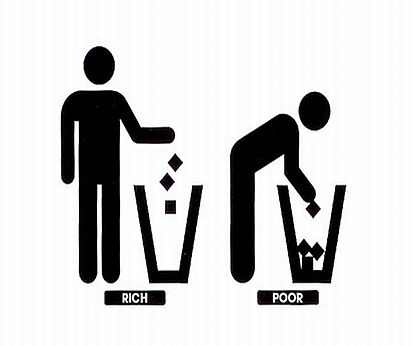Does The U.S. Spend More on Health Care Because We Have More Inequality?
We spend 60% more than the average developed country, according to Richard “Buz” Cooper. But after adjusting for income and price differences, we are spending only 31% more in terms of real resources.
 What explains this 31 percent? A large body of evidence suggests that it results from poverty and income inequality, which are more prevalent in the U.S. than in any other OECD country except Chile, Mexico and Turkey. And poverty is associated with substantial increments in spending. For example, the poorest decile of Medicare beneficiaries spends 30-40 percent more than the wealthiest; overall hospital utilization rates in large urban areas are 25-35 percent more than in their wealthiest Zip codes; and hospital readmissions are most prevalent from poor neighborhoods and in safety-net hospitals.
What explains this 31 percent? A large body of evidence suggests that it results from poverty and income inequality, which are more prevalent in the U.S. than in any other OECD country except Chile, Mexico and Turkey. And poverty is associated with substantial increments in spending. For example, the poorest decile of Medicare beneficiaries spends 30-40 percent more than the wealthiest; overall hospital utilization rates in large urban areas are 25-35 percent more than in their wealthiest Zip codes; and hospital readmissions are most prevalent from poor neighborhoods and in safety-net hospitals.
But there is more:
[S]ocial spending…in the U.S. is 33 percent less than predicted from GDP (Panel D)…It is difficult not to connect the dots from inadequate social spending to excess poverty and income inequality to more chronic illness and higher health care spending. These dots reside in the core of the OECD onion, and the failure to cope with them is placing an unsustainable burden on our health care system.


Wasn’t there a headline on here not too long ago that said poverty wasn’t really a problem in the U.S. because consumption was high?
And this says health spending is high because of poverty and income inequality…
Unless there is something more to this picture, they seem to contradict.
31% is still a huge amount.
And what are real resources?
Evidently they are some type of “normalized” system, so there is not an immediate inequality in examining countries with different currency valuations.
See! Government intervention is necessary, both for poverty and healthcare.
“[S]ocial spending…in the U.S. is 33 percent less than predicted from GDP”
Our failure to care for each other is right there in plain numbers. Republicans are selfish.
Both parties have contributed to it.
Democrats have worked for equality for all, while Republicans just want their oil buddies to be free while everyone else scrapes in the dirt to support themselves.
That sounds reasonable…..
There has to be an underlying reason why Medicare beneficiaries spend more, and system inefficiency doesn’t seem to be a sufficient answer.
Chronic health problems?
Seems likely, but did the problems develop before or after obtaining Medicaid?
“income inequality”
When a CEO can make 500 times what one of his workers does, inequality is going to be the result. Such a system is simply inequitable.
Where to begin?
How about with the observation that the poorest decile of Medicaid beneficiaries are likely to be those too sick to work. A lot of them are probably in nursing homes.
Of course they spend more!
And social spending like nursing homes is frequently not included in the health spending accounts of European countries. It is instead classified as social spending.